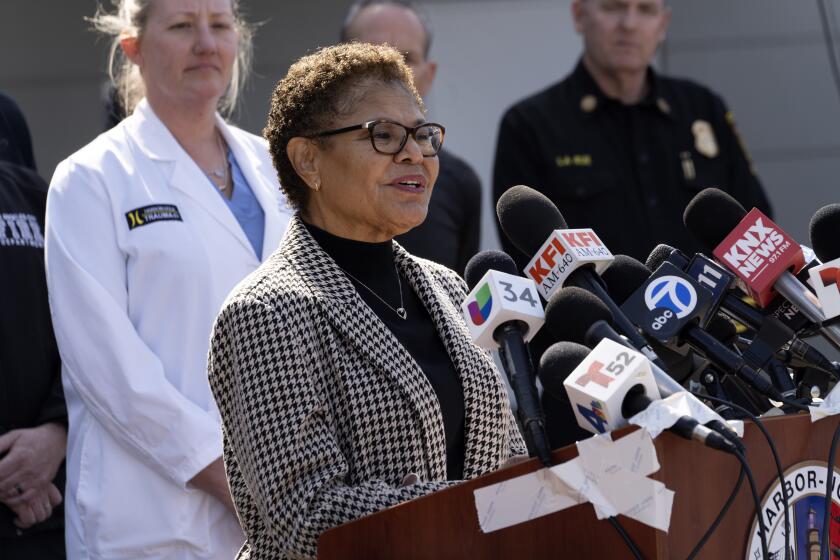State Designing Rules for Prop. 65 Warnings on Variety of Products
The Deukmejian Administration is drawing up rules to implement Proposition 65 that would require sternly worded health warnings on many common foods and consumer products, on signs at service stations and even on restaurant menus.
Beginning in 1988, as a result of the proposals, Californians may soon be seeing warning signs and labels for thousands of goods that proclaim: “WARNING: This product contains a chemical recognized by the State of California to cause cancer.”
At a Friday hearing, Administration officials also discused warning requirements that might mean that an oil refinery would have to notify all residents within three miles of its facilities that they are being exposed to low levels of the cancer-causing chemical benzene. A standard that stringent would mean reaching an estimated 150,000 individuals living near any of the large refineries in urban Southern California.
Pledges Enforcement
Although Gov. George Deukmejian strongly opposed Proposition 65, the anti-toxics initiative overwhelmingly approved by voters last November, he has pledged to enforce it. And industry groups, clamoring for certainty in interpreting the measure, have been working with the Administration to quickly develop regulations to implement it with a minimum of disruption to the state’s economy.
Under Proposition 65, businesses with 10 or more employees must warn consumers and workers of exposure to significant amounts of chemicals on a list prepared by the governor of substances known to the state to cause cancer. The requirement goes into effect 12 months after a chemical is added to the governor’s list, which now contains about 60 chemicals. Businesses that fail to comply are subject to lawsuits that can be brought by any citizen and fines of up to $2,500 per day.
Among substances already on the Proposition 65 list are such commonplace chemicals as benzene, present in gasoline, and arsenic, which is used in pesticides. Next month, a Deukmejian-appointed panel of scientists is scheduled to decide whether to add a number of other substances, including alcohol and aflatoxins, a naturally occurring family of substances found in a number of products including peanut butter and corn oil.
But the initiative is vague on what levels of danger require a warning or on how the warnings are to be presented.
Varied Proposals
In some cases, the proposed rules, developed by the state Health and Welfare Agency, would eliminate the need for businesses to provide any warnings at all. One proposal calls for exempting hazardous chemicals that occur naturally in foods--unless the substances could be avoided through proper processing and handling. The exemption would not necessarily apply to aflatoxins, which are caused by molds that attack nuts and grains, since levels can be minimized through proper storage and processing.
Manufacturers that use ordinary drinking water from public supplies contaminated with low levels of toxic chemicals would not need to warn consumers of that fact, as long as they do not add to the level of contamination.
Restaurants, which may add the cancer-causing chemical benzo(a)pyrene to foods through broiling and smoking, would be able to satisfy the warning requirements with a generic sign or menu notice stating that chemicals causing cancer or birth defects “may be present in foods or beverages sold or served here.”
The Administration’s proposals leave it to individual businesses to determine how best to convey the warnings to consumers and workers who are exposed to chemicals that are identified as causing cancer or birth defects.
Businesses that send cancer-causing chemicals into the air might put up signs warning nearby residents and passing pedestrians that “this area contains a chemical known to the State of California to cause cancer.”
Identification Required
The Proposition 65 proposals, which could become formal regulations having the force of law by the end of the year, require identification of products posing a risk of cancer or birth defects through package labels, cash register receipts, shelf labeling, signs, menus or other means.
A number of critics have charged that Proposition 65 would result in such a proliferation of warnings that the public would simply ignore them all. Others have voiced concern that California would be damaging its own image as a tourist attraction if the state’s restaurants and dry cleaners and factories all carried ominous warnings of low-level risks that are no different from other places in the country.
However, Thomas E. Warringer, the health and welfare undersecretary who is in charge of the Administration’s program for implementing the initiative, said he is trying to fashion rules that will apply Proposition 65 in a reasonable way.
“All this proposition does is get people some information and limit the amount of discharge (of chemicals) into drinking water,” Warringer said in an interview after the hearing. “It’s up to people to use the information intelligently.”
But the agency’s proposals have been criticized by both the industries that opposed Proposition 65 and by the environmental and consumer groups that supported it.
Ask for Exemption
Arguing that their products are already regulated by state and federal agencies that guarantee safety, manufacturers of food, drugs and cosmetics have asked to be exempted from all of the measure’s warning requirements. Their petitions are still being considered by the state Health and Welfare Agency.
On the other side, groups such as the Sierra Club and Consumers Union fear that the Administration’s proposals will weaken the impact of the initiative.
At the Friday hearing, Consumers Union representative Jim Shultz asked that the Administration insist on warning labels attached to the products themselves whenever possible rather than allowing warnings on signs or cash register receipts.
“If it is possible to put a price on a container, it is possible to put a warning on the container,” Shultz said.
More to Read
Get the L.A. Times Politics newsletter
Deeply reported insights into legislation, politics and policy from Sacramento, Washington and beyond. In your inbox three times per week.
You may occasionally receive promotional content from the Los Angeles Times.






